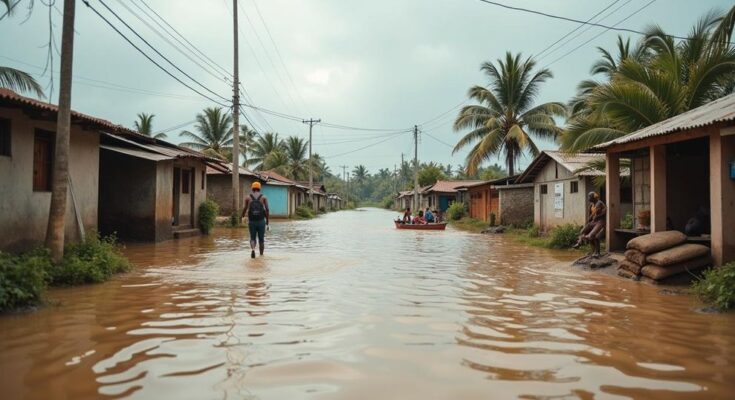The flooding in South Sudan has affected 893,000 people, displacing over 241,000 individuals. OCHA reports that heavy rains have rendered key supply routes impassable and that the humanitarian situation continues to worsen, influenced by political instability and the impact of ongoing conflicts in the region.
Recent reports from the United Nations Office for the Coordination of Humanitarian Affairs (OCHA) indicate that nearly 893,000 individuals in South Sudan have been adversely affected by severe flooding, with over 241,000 displaced as a result of this natural disaster. This marks a dire situation for the world’s youngest nation, which is grappling with the worst flooding it has faced in decades, exacerbated by vulnerabilities to climate change. OCHA’s statements reveal that flooding has impacted residents across 42 of the country’s 78 counties, as well as the contested Abyei Administrative Area. Notably, the states of Unity and Warrap in northern South Sudan account for over 40 percent of those affected. Many displaced individuals are reportedly seeking refuge on higher ground due to the relentless rains. The United Nations has expressed concern that the ongoing flooding compounds an already critical humanitarian crisis characterized by alarming food insecurity, economic downturn, continuous conflicts, outbreaks of diseases, and the spillover effects from the conflict in Sudan. According to a World Bank update released on October 1, it is projected that approximately nine million people, including refugees, will face “critical needs” in the year 2024. Since the conflict in Sudan escalated, South Sudan has received over 797,000 refugees as of September, predominantly South Sudanese returnees. Further complicating the situation in South Sudan is the political landscape, which remains fraught with instability. The presidency has announced yet another extension of a transitional period agreed upon in a peace deal from 2018, postponing elections initially scheduled for December by an additional two years. Many key provisions of this agreement have yet to be fulfilled, such as the establishment of a constitution and the unification of armed groups led by President Salva Kiir and his rival, Reik Machar. The United Nations mission chief, Nicholas Haysom, noted the pervasive frustration among the South Sudanese population, emphasizing that there is a growing demand for tangible evidence demonstrating the leadership’s commitment to pursuing a genuine democratic future. The country, rich in oil resources, has also faced challenges, particularly following the damaging of an export pipeline in conflict-ridden Sudan in February, severely impacting its crucial revenue streams.
South Sudan, which gained independence from Sudan in 2011, has been marked by a series of persistent challenges, including chronic instability, economic decline, and a vulnerability to climate-related disasters like floods and droughts. Following the onset of conflict in Sudan, South Sudan has experienced an influx of refugees, with the World Bank identifying an increasingly dire humanitarian situation aggravated by extensive flooding. These conditions highlight the interconnectedness of environmental, economic, and sociopolitical factors impacting the nation’s stability and its citizens’ wellbeing.
In summary, the catastrophic flooding affecting over 893,000 individuals in South Sudan has exacerbated existing humanitarian crises, including severe food insecurity and forced displacement. As the country grapples with internal political issues and the pressures of receiving refugees from Sudan, international entities are calling for visible commitment from South Sudan’s leaders to advance towards democratic reforms and stability. It is imperative that the international community monitors and supports the situation as it develops.
Original Source: www.barrons.com




